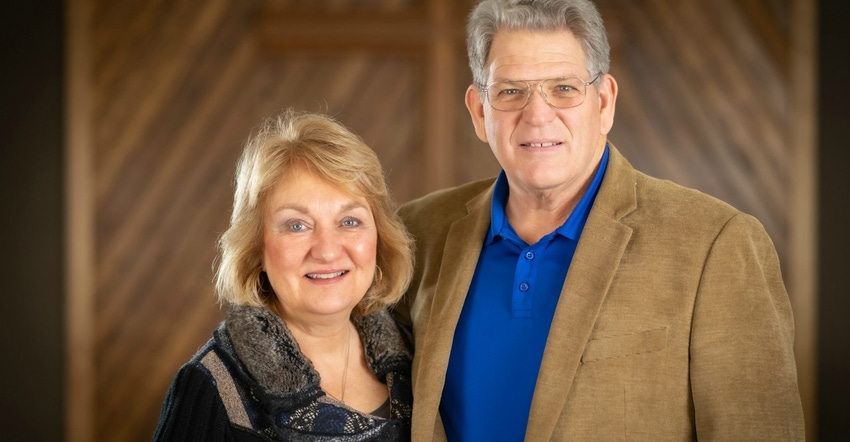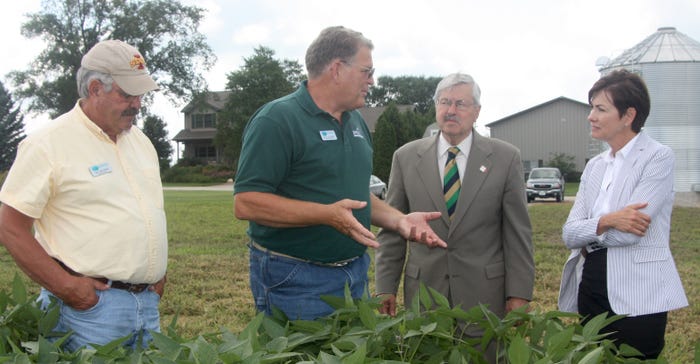March 2, 2020

A third-generation Iowa farmer, Rick Juchems takes pride in his work. “It is manifested in the many improvements he has made over the years my family has been living on the farm,” wrote Liz Ripley, in nominating her father for the Iowa Master Farmer Award.
“His love for farming and the Iowa landscape is displayed in his efforts to use and promote good land stewardship through service in organizations and his participation in research projects aimed at increasing cover crop adoption,” she wrote. “This conservation ethic was influential in my chosen career path with conservation education and outreach. He is an outstanding leader and community member, always willing to lend a helping hand and a contagious smile.”
In December 1978, following graduation from South Dakota State University, Rick and wife Jane returned to Iowa to farm land Jane’s parents owned. They started with growing corn and soybeans, raising hay for a cow-calf herd, and managing a farrow-to-finish hog operation.
Today, 40 years later, they are still farming in northeast Iowa near Plainfield in Butler County. They farm 456 tillable acres, plus custom-farm 76 acres. There are 92 non-tillable acres. Jane works off the farm as the Plainfield Library director. Rick hires seasonal help part time.
Rick and Jane raised two children on the farm. Living in Ames, Liz is married and is a conservation outreach and cover crop specialist for the Iowa Learning Farms and Water Rocks! programs, part of Iowa State University Extension. Son Nathanial lives and works in Minnesota with his wife and two children. Both are college grads with advanced degrees.
Strong conservation ethic
“After I became NRCS district conservationist for Butler County in 1990, I was pleased to find Rick in the northeast corner of the county doing an excellent job of farming,” says Lawrence Green, who wrote a letter of support for Rick’s nomination. “Before long, Rick got involved in our soil and water conservation district and has served as a Butler SWCD commissioner for over 23 years, with many of those years as chairman.
“Rick also took on leadership roles in the Conservation Districts of Iowa organization as regional director and president, in the Cedar Valley Resource and Conservation District as chair, and in the North Central USDA SARE Advisory Council. In 2012, Rick was named Outstanding Soil and Water Conservation District Commissioner in Iowa.”

LESSONS LEARNED: “Trying various practices to see what works, I’ve learned how conservation makes the land more sustainable and productive,” says Juchems (center). Here, he’s explaining his no-till practices to then Gov. Terry Branstad and Lt. Gov. Kim Reynolds who visited the Juchems farm several years ago as part of a conservation tour. Listening in is farmer Jim Lindaman.

Using numerous practices to protect soil and water, Rick is a role model for no-till and cover crops, willing to share his experience with others individually, at field days and through on-farm demonstration plots.
“He’s participated in the Conservation Reserve Program, Conservation Stew-ardship Program, Environmental Quality Incentives Program and several Iowa Department of Ag and Land Stewardship programs to strengthen his conservation farming system,” Green says. “He has grass waterways, filter strips, shelterbelts, manure storage structures, terraces, cover crops, contour buffer strips, field borders, habitat, and uses nutrient management.”
Managing crop nutrients
In 2019, a new solar array was installed and now produces two-thirds of the electricity used on the farm. Monitoring of two hog finishing buildings is controlled using smartphone technology.
Rick and Jane raised cattle for many years, but due to beef processing plant closures and tightening markets, they quit finishing cattle. They custom-feed 2,300 head of hogs in confinement with all-in, all-out production. Manure is applied as prescribed by an Iowa Department of Natural Resources manure management plan for corn production.
The farm uses a corn-soybean rotation with 100% of tillable acres covered with cover crops in the fall. Liquid hog manure is fall-applied using GPS and a flowmeter to accurately place nutrients according to Iowa manure management plan standards. Machinery is equipped with a yield monitor, GPS mapping and autosteer.
Soybeans are no-tilled into cornstalks with a drill on 10-inch spacing. Corn is planted in 30-inch rows. Anhydrous is applied for corn preplant with one pass with a field cultivator to level the field. Non-tillable acres are mostly in the Conservation Reserve Program, or in grass waterways and buffer strips along all creeks. The farm also uses prairie strips, has a shallow water area to stop runoff from the building site, and grows windbreaks of conifer and deciduous trees and shrubs around buildings, which are also used as bird and pollinator habitat.
Giving back to community
Rick and Jane are active members of St. Paul’s Lutheran Church in Waverly. Jane volunteers at Carnegie Cultural Center in New Hampton. Rick served on the Butler County Cattlemen board, holding officer positions, and on the Bremer County Corn and Soybean Board. He represents District 3 on the Iowa Soybean Association. He is chair of the Butler County Farm Service Agency board and is on the Northeast Iowa Research Farm board.
Rick has worked on a nitrogen study with ISU Extension through the Northeast Research Farm over the years, and on a cover crop demonstration with ILF and Practical Farmers of Iowa. Other volunteer positions in the community include being a Cover Crop Champion, and helping 10 or more farmers in the area line up cover crop seed and aerial application to improve soil health.
About the Author(s)
You May Also Like






